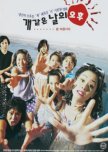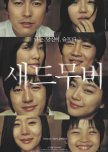 Upcoming JTBC K-drama "Sacred Divorce" to begin airing during the first half of the year
Upcoming JTBC K-drama "Sacred Divorce" to begin airing during the first half of the year Kim Ji Young has one of the most common female names for people her age. She works at a PR agency. Kim Ji Young gets married and has a daughter. So she can raise her daughter, Kim Ji Young quits her job. She leads an ordinary life up to this point. Suddenly, Kim Ji Young begins to talk like her mother, her older sister and other people. She seems possessed by other people. What happened to her? (Source: AsianWiki) ~~ Adapted from the novel "Kim Jiyoung, Born 1982" (82년생 김지영) by Cho Nam Ju (조남주). Edit Translation
- English
- 中文(台灣)
- 中文(简体)
- Español
- Native Title: 82년생 김지영
- Also Known As: 82nyeonsaeng Kimjiyoung , Kim Ji Young, Born in ’82
- Director: Kim Do Young
- Screenwriter: Yoo Young Ah
- Genres: Psychological, Life, Drama, Family
Cast & Credits
- Jung Yu Mi Main Role
- Gong Yoo Main Role
- Kim Mi KyungMi SookSupport Role
- Park Sung Yun Support Role
- Lee Bong RyunHye SooSupport Role
- Kim Sung CheolJi SeokSupport Role
Reviews

This review may contain spoilers
This is a feminist movie. What kind of image does it conjure up for you?I can tell you that this isn't a story about a confident, "girl crush" woman. Rather, it follows the story of an ordinary woman and the gender based microaggressions she faces.
This movie isn't an easy watch precisely because it's so real (similar to Misaeng). You could only hope that all of those events don't happen to the same person in real life though.
I knew about the general plot before watching the movie but it still really hit me hard. At the start, I thought it was really fast-paced because it just threw you into the movie. But as the movie progressed, I got used to it and was able to connect with it more.
However, I think reading the book would help you understand the movie better. There was a few scenes that didn't feel resolved in the movie, but I think were explored in the book.
I was also confused if Kim Ji Young's behavior was supposed to be more metaphorical or literal. After reading some reviews of the book, I think I understand what it's trying to say. There was one review in particular that said she didn't have a voice in this society so she had to adopt other personas / mimic other people in her life to say something.
Was this review helpful to you?

This review may contain spoilers
Showing simple normalcy for generations of SK women being gagged&bound by society's endemic sexism
"Kim Ji-young: Born 1982" puts every die-hard Korea fan through their paces: how far does the love for country and culture actually go? The KMovie also does away with any illusion surrounding romanticized and socially idealized yearnings that revolve around the concept of 'in love-engaged-married-happy family'."Kim Ji-young: Born 1982" broke the 2 million mark worldwide as a bestseller (by author Cho Nam-joo). It is also considered the most borrowed book in two consecutive years after publication. The KMovie was also extremely successful. In South Korea, between October 2019 and November 2020 around 3.6 million people went to the movies to watch. In addition, numerous prizes were awarded throughout Asia.
Calmly, unagitatedly and almost objectively distant, the camera focuses on the ordinary life of a typical South Korean woman, wife and mother in her 30s. Actually, she doing quite well. We accompany her in her everyday life between laundry and kindergarten, with her (actually quite attentive, loving) husband, with her in-laws, with her family of origin, with friends, with flashbacks of her childhood and at work, and finally with the therapist. This could all be any live of many a South Korean woman. That's not special at all. It's so cruelly normal that it even hurts. By showing simple normalcy, the story also becomes an outcry for several generations of women gagged and bound by society's endemic sexism.
Gagged and tied up by such a conservative, rigid, discriminatory socialization that is literally burned into flesh, so hardly anybody even considers alternative role models and self-images. There is a lack of role models that give women something like self-love and self-confidence that go beyond identifying with role expectations by family and society. Women somehow grow up as prisoners of those restrictive expectations - in a prison with doors, that technically are not closed, yet in practice barricaded by the mercilessly experienced sexism since early childhood. Accordingly, there is a lack of awareness of human dignity beyond gender roles. For women and men alike. And as we all know, such awareness would be the first path to any change...
In this respect, "Kim Ji-young: Born in 1982" holds up a merciless mirror in a calm, objective and non-judgmental manner, which focuses on the great evil that everyone simply takes for granted. Apparently, around 68 percent of cinemagoers were women. At least, the other 32 percent were men, supposedly.
In one of the last scenes, (which, like all the others in the film, gains its power from the simple, unquestioned und yet unbelievable normality) the underlying emotional muteness is finally allowed to speak up - not loudly and rudely though, but objectively subjectively and, despite all the justified anger, consistently in all modesty calmly, too.
In the face of the spilled coffee, instead of accepting the comments and accusations of her social environment with shame, concern and apologetic words, the FL has her outspoken objections. She eventually stands up for herself... actually, you should think, quite simply, as if it were a matter of course. And yet: downright unheard of. Because: Shameless in the best sense of the word... she no longer lets others shame her for what and who she is. She is slowly but surely developing a somewhat healthy approach to her own self-confidence as a person with self-worth and self-love beyond gender - a person who cannot be reduced by tradition to just a family concerned role concept within a hierarchical society. From this, the FL nurtures a new attitude towards those who traditionally believe they have more value in the social ranking.
Just a comparatively small, handy book; just a two hour movie. The story of Kim Ji-young, born in 1982, has sparked a lot of discussion throughout South Korea. The common, everyday (South Korean) madness shown knows how to touch and quietly infuriate. For me in faraway Germany, too, the KMovie wasn't boring for a minute.
-------------------------------------------------------
--- Outlook ---
'If everyone would act up like that... where would we end up?' - In this sense, the book and the film also led to a horrified outcry within conservative circles in the country. The main actors in the KMovie, for example, had to endure hateful comments for even taking part in it. Just this factual inventory of normal madness of just about every woman in the supposedly modern, innovative South Korea got conservative minds going...
...on the other hand, women affected finally received the balm of cross-class compassion, which for a moment opened up the space for solidary, cross-generational sisterhood. As insignificantly common and simple as Kim Ji-young, born in 1982, may be, the social impact was equally great - the consistently overlooked, completely disregarded reality that has been systematically carried out for countless generations out of principle and tradition, discrimination against (in this specific case) South Korean women.
South Korean society is already shrinking. Earlier than expected. And much faster than expected. No wonder.
Women born in the 1980s by now increasingly began to feel painful about their corsets. A milestone!
Those who were born in the 1990s and 2000s, some among them started to increasingly openly dare to actively shake up the social corset - simply by no longer accepting their 'certain' female role. Another milestone!
However, there is still a long way between shaking up and breaking out or even redefining. Eventually, women can only take this step together with men, who also urgently need to work on their role models, their attitude towards women and a new social self-image. Only then can the shrinking of South Korean society be stopped - a shrinking that, in my eyes, is an expression of a massive imbalance between innovative, turbo-capitalist high-speed in the global fast lane on the one hand, and an ignorant, sexist conservatism on the other, which acts like a lead foot screwed onto the brakes. Nevertheless, growing forces are apparently pushing for an urgently needed, integral, truly progressive transformation of existing values.
Was this review helpful to you?




















































